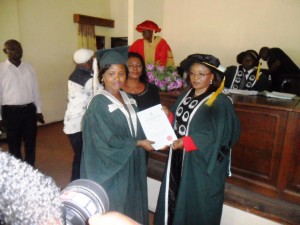by crossriverwatch admin

The Teachers Registration Council of Nigeria, TRCN has inducted 107 members in its first induction ceremony held in Calabar recently.
The Cross River state Commissioner For Education, Professor Offiong Offiong admonished the inductees to abide by the ethics of teaching which he described as pertinent in all strides.
The Commissioner who was represented by Mrs. Minka Takon, a Director in the Ministry of Education maintained that “The state government has spent a lot on education of both students and teachers alike and we expect meaningful results that can translate to producing an educated society”.
Professor Offiong reiterated that the present administration is not smiling with any form of examination malpractice be it perpetrated by the teacher or student and anyone found guilty will be disciplined accordingly.
In his address, the Registrar, Teachers Registration Council of Nigeria, TRCN Professor Addison Mark Wokocha revealed that the TRCN was established by Act 31 of 1993 now CAP T3 of 2004 and saddled with the sole responsibility of determining who becomes a teacher and also supervise the activities of teachers.
The registrar who was represented by Dr, Jacinta Eze commended the inductees for painstakingly passing through the training process which he described as rigorous and charged them to go out and be good ambassadors of the noble profession.
The state coordinator of NTI, Dr. Esu Nsan expressed happiness for being part of the ritual which she boasted is for well trained and equipped teachers whose pleasure is to educate all and sundry.
She charged the inductees to maintain a high sense of discipline if they must succeed in the herculean endeavor they have chosen.
Presenting a paper on “Access To Distance Education: Implication For Development In Nigeria” Dr. Matthew Nsing Ogar of Education Faculty Cross River University of Technology, CRUTECH emphasized the importance of distance learning, saying it is the most flexible complement to the regular form of learning which should be adequately encouraged in all facets.
He itemized some benefits of distance learning to include; expanding access to education, reduction of institutional capacity constrain, increased access to more experts in various fields, encouragement of ICT education as a tool and reduction of the effect of strikes and mild wars.
Dr. Nsing also listed the challenges of distance learning to include: high illiteracy rate, ICT and non ICT wise, unemployment, increased violence, inequality in terms of access to education, and low capacity of the existing institutions of learning to accommodate the over one million individuals that apply for JAMB yearly with only about 225, 000 being admitted.
According to him the way forward is to strengthen the National Teacher Institute and National Open University of Nigeria, NOUN. Curriculum should be critically examined and reviewed to be in tune with students and society standards, proper enlightenment campaigns and upgraded ICT Infrastructure along with training across the country.
follow us on twitter @crossriverwatch
Since You Are Here, Support Good JournalismCrossRiverWatch was founded on the ideals of deploying tech tools to report in an ethical manner, news, views and analysis with a narrative that ensures transparency in governance, a good society and an accountable democracy. Everyone appreciates good journalism but it costs a lot of money. Nonetheless, it cannot be sacrificed on the altar of news commercialization. Consider making a modest contribution to support CrossRiverWatch's journalism of credibility and integrity in order to ensure that all have continuous free access to our noble endeavor. CLICK HERE |
New Feature: Don't miss any of our news again.Get all our articles in your facebook chat box.Click the Facebook Messenger Icon below to subscribe now
Text Advert by CRWatch :Place Yours
Will You To Learn How To Make Millions Of Naira Making Special Creams From Your Kitchen?.Click Here
Expose Your Business And Make More Sales. Advertise On CrossRiverWatch.com Today